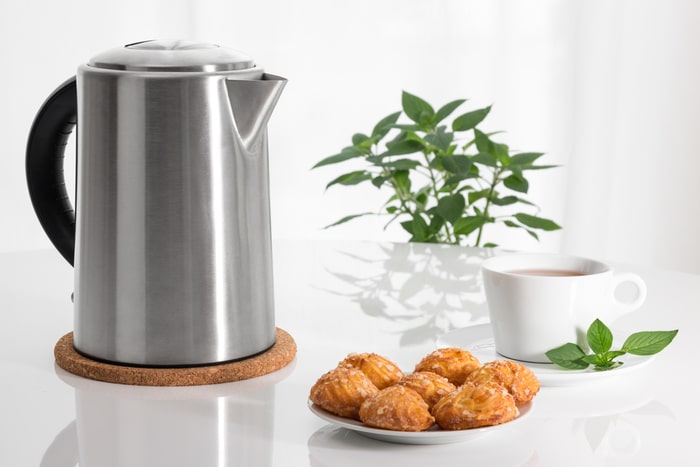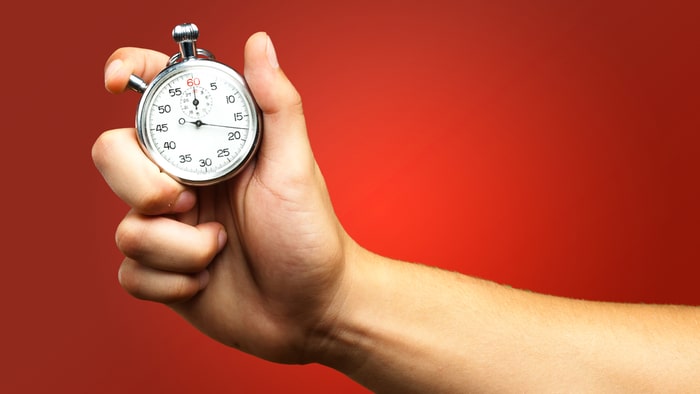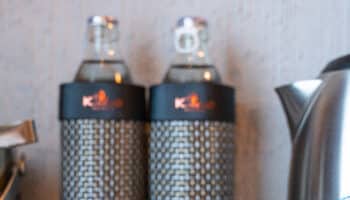We've independently reviewed this article to make sure it's as accurate as we can make it.
To find out more about our article creation and review process, check out our editorial guidelines.
Are you in love with hot beverages but are worried about the cost of boiling your kettle?
You’re not alone! In fact, paying high electricity bills for boiling a kettle is a common concern among tea lovers and other people who prefer using kettles over microwaves or regular pots.
Kettles are nothing new, and while they’ve become more technologically advanced with time, they’re still designed to fulfill a single purpose – heat water to a boiling point.
Whether you’re using a traditional kettle that needs fire, or an electric version, lowering the resources required to reach the perfect temperature is key, which is why I’ve created the article below, where you’ll find a free calculator to estimate how much power you’re using in the process.
I’ve also included some insightful data you’re going to love. Keep reading to get all the answers!
Why trust us? This article was written by Craig Anderson and James Blackford.
Craig has helped thousands of other homeowners repair their appliances since 2016.
James is one of our resident appliance experts with over 16 years of experience. He currently works as a Master Technician for SquareTrade, and runs his own appliance repair business.
The Calculator
How I’ve Estimated Kettle Boiling Costs
To create the calculator and estimate kettle boiling costs, I took into account several factors, such as the cost of electricity (as you know, the cost varies from State to State) and the amount of water you’re boiling (4 cups = 1L). I also considered the power of your kettle, which might not make sense right now, but please bear with me, and it will.
By considering all the above elements, we can reach an approximate power consumption for your kettle, so you can keep it in check and even try to work out ways to reduce it further.
How Long It Takes to Boil Your Kettle
My fellow kettle nerds out there have probably been wondering precisely how long it takes to boil a kettle. Let me walk you through the calculations I used in the abovementioned tool. If you’re as curious as me, you’ll love the detailed explanation, but if you’re not, you’ll want to skip the following part and move to the next section instead!

Working Out the Energy Needed
Working out the energy needed for boiling your kettle is rather easy. If you still have your old physics book from school somewhere, it’s time to return to the basics. The first thing you need to remember is the heat capacity of water. In Joules, the heat capacity of water can be defined as the energy required to increase the temperature of water by 1 degree Celsius.
Typically, the number is 4.2kJ/oCkg.
Next, you must know the starting temperature of the water you’re trying to boil. Under normal circumstances, room temperature should be about 20 degrees Celsius (68 °F).
In my experience, once you have the initial temperature, the next thing you want to factor in is the target temperature, which, in the case of water, is 100 degrees Celsius for the boiling point.
Now that we have all the necessary information, let’s crunch some numbers. To calculate how much energy is needed to make 1 cup of water reach its boiling point, we must multiply (heat capacity * temperature change *volume of water).
For the equation (4.2kJ/oCkg * 80 °C * 0.25L) the result is = 84kJ (kilojoules).
Working Out Time Taken
Now that we know exactly how much energy is needed to make 1 cup of water (or 0.25L) reach its boiling point of 100 °C, we can use the equation Time = Energy / Power. The equation will help us determine how long your kettle will take to boil. In my opinion, the result should always be measured in kW (kilowatts).

Since we already calculated that a cup of water needs 84 kilojoules to reach its boiling point, then we can do some simple equations. Let’s consider a kettle with a power of 2000 watts, or 2 kW:
Time = Energy / Power
Substituting…
Time = 84kJ / 2 kW
Time= 42
By the above calculations, we can conclude that when placed to boil in a kettle with 2 kW (or 2000 watts) of power, it will take roughly 42 seconds for a cup of water (0.25L) to reach its boiling point of 100 °C.
*Results can vary slightly depending on the water’s starting temperature and the kettle’s wattage, as any changes in either factor will affect the entire equation.
Why Power Doesn’t Matter
Believe it or not, power doesn’t matter, as the cost of boiling a powerful kettle and one that isn’t so much so is the same.
Why? It all comes down to the time-power tradeoff.
A kettle with 2000 watts of power that takes 42 seconds to boil your water will consume as much electricity as a 200-watt model that takes 7 minutes. Theoretically, this means that time and power cancel each other out, which means that you’ll end up paying exactly the same amount for any model.
Cost to Boil a Kettle
The cost of boiling a kettle remains virtually the same regardless of the kettle model. I often find that the only difference will be with time, as a more powerful kettle will make water reach its boiling point considerably faster than one with lower wattage.
So, if you’re a little impatient, you might be better off buying a high-wattage appliance. Just make sure you’re plugging the kettle into an outlet that can take the high amount of power required, as otherwise, you might blow a fuse.
Conclusion
That about sums it up!
Owning an electric kettle is a must if you love drinking tea or any other kind of hot beverage. But what happens when you suspect your kettle is skyrocketing your electricity bills? Then, you might have to think twice about boiling your kettle so often.
Luckily, as I hope this piece has helped you better understand, the wattage and model of the kettle you own will not change the cost of boiling water. The main difference will lie in how long you’ll wait for the desired results.
Thank you very much for sticking with me all the way to the end. If this article proved useful and answered your most burning questions, please check out our other incredible resources below and consider subscribing to our newsletter.
On the site, you can always find solutions to everyday appliance issues and questions you may have, such as what to do with an old kettle you want to dispose of.
I wish you nothing but the best!
— Craig.







